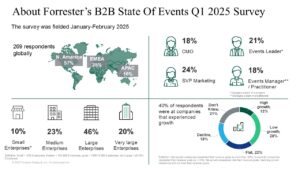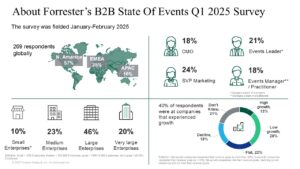The Evolving Challenges of B2B Events
B2B event teams have faced increasing challenges over the past year, driven by a volatile economic and political climate that has exacerbated existing pressures related to inflation, budgets, and staffing. The competition for both attendees and sponsors has intensified, with leaders struggling to attract the right quantity and quality of participants to meet their objectives. Attendee behavior is also undergoing a significant shift, with people registering later and expecting more interactive and personalized experiences. As a result, the planning and execution of successful events have become increasingly complex.

Forrester data reveals that overall event satisfaction dropped by 8% from 2024 to 2025 as teams struggled to adapt to these changes. To help leaders navigate this evolving landscape, Forrester’s Q1 2025 State Of B2B Events Survey gathered insights from more than 250 event decision-makers to uncover key trends.
Key Findings from the Forrester Survey
Budgets and Resources Are Strained
For the second consecutive year, budgets have remained flat or decreased for two-thirds of event teams. Even among the 19% of organizations that have seen budget increases, the reality is that, due to inflation, they are likely flat or down in real terms.
Shift in B2B Event Mix
As budgets tighten, the B2B event mix is evolving. Marketers are prioritizing smaller hosted events, with 59% planning to host more of these events over the next 12 months. In contrast, the number of organizations planning larger hosted events fell by 12% year on year as marketers shifted resources and focus towards smaller events.
Focus on Core Objectives
More than 90% of organizations are focused on the core objectives of getting the right audience to their events, demonstrating ROI, and improving post-event follow-up. However, this focus on fundamentals has led to a deprioritization of longer-term considerations such as inclusivity, accessibility, and sustainability, which have fallen in importance year on year and now rank lowest on the priority list.
B2B Event Technology: A Missed Opportunity
More than a quarter (28%) of the largest organizations have deployed six or more event technology platforms, yet only one in five has fully integrated their primary platform into their broader sales and marketing tech stack. Data shows that when organizations do integrate, overall event satisfaction increases significantly.
Low Adoption of AI in B2B Events
Despite AI’s potential to enhance productivity, attendee personalization, data analytics, and content repurposing, the majority of organizations are still in the learning phase. Using AI for content creation is the number one current use case, with 39% of marketers currently utilizing it for this purpose. However, a growing number plan to use AI more extensively over the next 12 months.
Siloed Approach to B2B Event Planning
In many organizations, events are planned by disparate teams, resulting in fragmented planning and suboptimal attendee experiences. The data shows that when a centralized team runs the majority of events, overall event satisfaction levels rise significantly.
Forrester clients can access an on-demand webinar to delve deeper into the B2B event survey findings or request a guidance session to better understand the implications of these trends for their teams and organizations.


